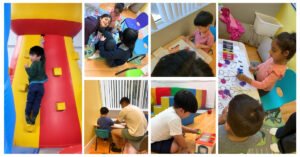5 Revolutionary Changes in Vancouver Pediatric Occupational Therapy That Are Transforming Children’s Lives in 2025
The field has undergone a remarkable transformation, moving from traditional one-size-fits-all approaches to highly personalized, technology-enhanced, and culturally responsive care that puts families at the center of every decision. At KidStart Pediatric Therapy based in Burnaby BC, we’re witnessing firsthand how these revolutionary changes are accelerating children’s development and empowering parents with tools and strategies that work in real-world settings.
The integration of artificial intelligence, breakthrough research in early intervention, and innovative telehealth solutions are creating unprecedented opportunities for Vancouver children to reach their full potential, regardless of their starting point or family circumstances.
AI-Powered Personalized Treatment: Precision Therapy for Every Child
Recent studies highlight how early intervention significantly improves developmental outcomes for children with disabilities, emphasizing the critical importance of timely and personalized pediatric occupational therapy. (Source: Harvard Health Publishing)
Artificial intelligence integration in Vancouver’s pediatric occupational therapy practices has moved beyond experimental phases to become a game-changing reality that’s transforming how children receive care. These sophisticated AI systems analyze vast amounts of data about each child’s unique needs, progress patterns, and response to different interventions to create truly personalized treatment plans that adapt in real-time.
Modern AI-assisted assessment tools can identify developmental patterns that might take human therapists weeks to recognize, allowing for faster, more accurate diagnosis and intervention planning. For example, virtual reality systems combined with AI analytics can track a child’s fine motor movements with incredible precision, identifying specific areas for improvement while making the assessment process feel like playing engaging games rather than clinical testing.
The real-time feedback capabilities of AI systems are particularly powerful for both therapists and families. During therapy sessions, AI monitoring can instantly alert therapists when a child is showing signs of fatigue, frustration, or optimal learning moments, allowing for immediate adjustments to activities. Parents receive detailed progress reports that translate complex therapeutic goals into understandable achievements, helping them celebrate milestones and understand exactly how their child is developing.
Predictive analytics help Vancouver families plan for their child’s future needs by analyzing developmental trajectories and identifying potential challenges before they become significant obstacles. This proactive approach allows families to prepare support strategies and make informed decisions about educational placements, extracurricular activities, and long-term goals.
Perhaps most importantly, AI systems excel at identifying what works best for individual children, learning from each successful intervention to refine future recommendations. This means that every child benefits not only from their own treatment data but also from anonymized insights gathered from thousands of other children with similar needs, creating a constantly improving knowledge base that enhances outcomes for all Vancouver families.
Early Intervention Revolution: The Critical Window That Changes Everything
The significance of early intervention in pediatric occupational therapy has reached unprecedented recognition in 2025, with Vancouver families increasingly understanding that the earliest years of a child’s life represent a unique window of neuroplasticity and developmental opportunity that can influence outcomes for decades to come.
Comprehensive team-based approaches now bring together occupational therapists, physical therapists, speech-language pathologists, and early childhood educators to address all aspects of a child’s development simultaneously. This collaborative model means that a child working on fine motor skills might simultaneously receive support for communication challenges and social interaction difficulties, creating synergistic improvements that accelerate overall progress.
Parent coaching in natural environments has become the gold standard for early intervention, with therapists training Vancouver families to integrate therapeutic activities seamlessly into daily routines. Instead of therapy being something that happens only during clinic visits, parents learn to turn diaper changes, meal times, and play activities into powerful developmental opportunities that support their child’s growth throughout every day.
The strengths-based framework that defines modern early intervention focuses on building upon each child’s existing capabilities rather than simply addressing deficits. This positive approach helps children develop confidence and motivation while achieving therapeutic goals, creating a foundation for lifelong learning and adaptation.
Research consistently demonstrates that children who receive high-quality early intervention services require fewer intensive supports later in life, perform better academically, and develop stronger social relationships. For Vancouver families, this translates into both immediate improvements in daily life and long-term benefits that can reduce the need for ongoing specialized services as children grow and develop.
The investment in early intervention typically yields remarkable returns, with studies showing that every dollar spent on quality early childhood development programs can return $7-12 in reduced future costs for special education, healthcare, and social services. More importantly for families, early intervention often means the difference between a child needing significant ongoing support throughout school versus developing the skills for independence and success.
Family-Centered Care: Empowering Parents as Partners in Healing
The evolution toward family-centered care represents perhaps the most fundamental shift in how Vancouver pediatric occupational therapy services are delivered, moving from a model where therapy happens “to” children to one where families become empowered partners in their child’s developmental journey.
Collaborative goal-setting now involves parents as equal participants in determining what outcomes are most important for their child and family. Rather than therapists setting clinical objectives in isolation, families help identify priorities that align with their daily life, cultural values, and long-term aspirations. This might mean focusing on skills that help a child participate in family traditions, succeed in their chosen activities, or develop independence in areas that matter most to their specific situation.
Home strategy integration has become sophisticated and practical, with therapists providing families with detailed, easy-to-implement plans that transform everyday activities into therapeutic opportunities. Parents learn how to modify toys, adjust household routines, and create environments that support their child’s development without requiring expensive equipment or disrupting family life.
Education and empowerment programs help Vancouver parents understand their child’s unique needs, recognize signs of progress, and advocate effectively for appropriate services in educational and community settings. Parents who understand the “why” behind therapeutic recommendations become more confident implementers of strategies and better advocates for their children’s needs.
The emotional support component of family-centered care acknowledges that parents often experience stress, confusion, and worry about their child’s development. Modern pediatric OT practices provide counseling resources, support groups, and connection with other families facing similar challenges, creating communities of support that extend far beyond individual therapy sessions.
Cultural responsiveness ensures that therapy recommendations align with family values, traditions, and practical realities. Vancouver’s diverse population requires therapists who understand how different cultural backgrounds might influence child-rearing practices, family dynamics, and attitudes toward disability or development challenges, ensuring that all families feel respected and understood.
Telehealth Innovation: Bringing Expert Care Into Your Living Room
Telehealth services in Vancouver pediatric occupational therapy have evolved from an emergency pandemic solution to a sophisticated, permanent service delivery model that’s actually improving access and outcomes for many families across British Columbia.
Remote assessments using standardized tools like the Canadian Occupational Performance Measure can now be conducted with remarkable accuracy through video platforms, allowing families to receive professional evaluations without traveling to clinic locations. Therapists can observe children in their natural environments, gaining insights into how developmental challenges impact daily life in ways that clinic-based assessments might miss.
Parent coaching sessions conducted via telehealth have proven particularly effective, allowing therapists to guide families through therapeutic activities in real-time while children are in familiar surroundings where they’re most comfortable and likely to demonstrate their true capabilities. Parents can ask questions immediately as they arise, and therapists can provide instant feedback and adjustments.
Hybrid service models combine in-person and remote sessions to maximize both effectiveness and convenience. A child might receive hands-on assessment and intensive intervention during clinic visits while maintaining progress through weekly telehealth check-ins and parent coaching sessions. This approach often provides more frequent contact with therapists while reducing travel time and costs for families.
Technology-enhanced interventions use interactive apps and games that children can access from home between therapy sessions, turning therapeutic activities into engaging entertainment that children look forward to rather than tasks they resist. These digital tools often include progress tracking, achievement systems, and customizable difficulty levels that keep children motivated while working on specific therapeutic goals.
Geographic accessibility has been revolutionized by telehealth, allowing families in remote areas of British Columbia to access specialized pediatric occupational therapy services that were previously unavailable. Rural families no longer face the choice between inadequate local services or expensive travel to Vancouver for specialized care.
The cost-effectiveness of telehealth services makes quality pediatric occupational therapy accessible to more families, reducing travel expenses, time away from work, and childcare challenges for siblings. Many insurance providers now recognize telehealth as equivalent to in-person services, making this option financially viable for families who might otherwise struggle to access consistent care.
Quality outcome data consistently shows that children receiving hybrid telehealth services often demonstrate progress rates equal to or better than traditional clinic-only models, particularly when parents are actively engaged in the treatment process and have appropriate technology support.
Sensory Integration Breakthrough: Understanding the Hidden Challenges
Sensory processing research has revolutionized how Vancouver pediatric occupational therapists understand and address the hidden challenges that affect many children’s ability to learn, play, and interact successfully with their environment. What was once dismissed as behavioral issues or attention problems is now recognized as complex neurological differences that require specialized intervention approaches.
Advanced sensory assessment tools can now identify subtle sensory processing differences that significantly impact a child’s daily functioning. These might include hypersensitivity to clothing textures that makes getting dressed a daily battle, sound sensitivities that interfere with classroom learning, or proprioceptive differences that affect a child’s awareness of their body in space, leading to coordination challenges or risk-taking behaviors.
Personalized sensory diets have become sophisticated intervention strategies that help children regulate their nervous systems throughout the day. Rather than generic advice, therapists now create detailed plans that specify exactly which sensory activities will help individual children stay calm, focused, and ready to learn. These might include specific movement breaks, weighted tools, or environmental modifications that support optimal functioning.
Environmental modification strategies help Vancouver families create homes and advocate for school environments that support their child’s sensory needs. This practical approach recognizes that changing the environment is often more effective than trying to change the child, leading to improved behavior, better academic performance, and reduced family stress.
Collaborative approaches with teachers, childcare providers, and other professionals ensure that sensory strategies are consistently implemented across all environments where a child spends time. This coordination is crucial because sensory processing differences affect children throughout their day, not just during therapy sessions.
The impact on family dynamics can be transformative when sensory processing challenges are properly understood and addressed. Parents often report that understanding their child’s sensory needs leads to more patience, better problem-solving, and stronger parent-child relationships as former sources of conflict become opportunities for support and understanding.
Evidence-Based Practice Evolution: Research That Actually Changes Lives
The commitment to evidence-based practice in Vancouver pediatric occupational therapy has evolved from simply following research recommendations to actively participating in the creation of knowledge that improves outcomes for children and families throughout British Columbia and beyond.
Outcome measurement tools now provide families with clear, understandable data about their child’s progress, moving beyond subjective impressions to concrete evidence of improvement. The Canadian Occupational Performance Measure (COPM) and other standardized assessments help families track progress toward goals that matter most to their daily lives, providing motivation and concrete evidence of therapeutic value.
Research participation opportunities allow Vancouver families to contribute to the advancement of pediatric occupational therapy while potentially accessing cutting-edge interventions before they become widely available. KidStart Pediatric Therapy actively collaborates with universities and research institutions, giving families the opportunity to help shape the future of pediatric care while receiving the most current interventions.
Cultural adaptation of interventions ensures that evidence-based practices work effectively for Vancouver’s diverse population. Researchers are increasingly recognizing that interventions developed primarily with one cultural group may need modification to be effective with families from different backgrounds, leading to more inclusive and effective therapeutic approaches.
Technology integration in research allows for more precise data collection about what works best for different types of children and challenges. Virtual reality systems, wearable sensors, and smartphone apps collect detailed information about children’s responses to various interventions, creating rich databases that inform future treatment recommendations.
Quality improvement initiatives use data from clinical practice to continuously refine service delivery, ensuring that Vancouver families receive the most effective interventions available. This commitment to ongoing improvement means that therapeutic approaches evolve based on real-world evidence of what produces the best outcomes for children and families.
The translation of research into practice happens more quickly than ever before, with new findings integrated into clinical care within months rather than years. This rapid knowledge transfer ensures that Vancouver children benefit from the latest discoveries in pediatric neuroscience, developmental psychology, and therapeutic innovation.
The revolutionary changes in Vancouver pediatric occupational therapy during 2025 represent a fundamental shift toward more personalized, family-centered, and technologically enhanced care that’s producing unprecedented outcomes for children with developmental challenges. These advances mean that families no longer have to choose between convenience and quality—they can access expert care that adapts to their unique needs and circumstances while maintaining the highest standards of evidence-based practice.







